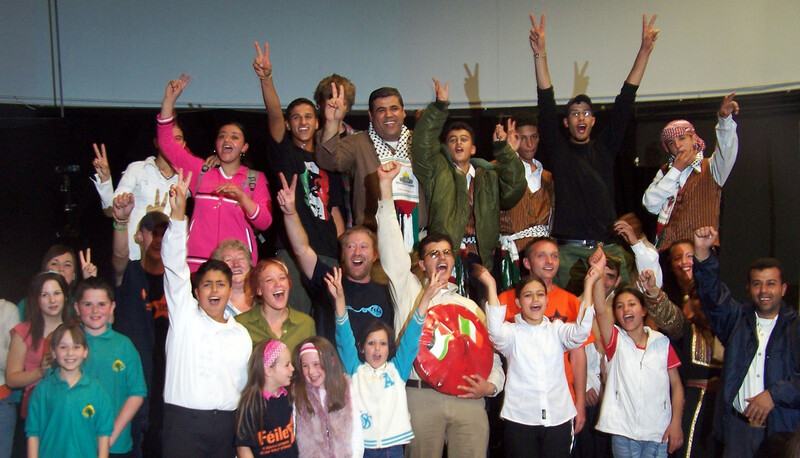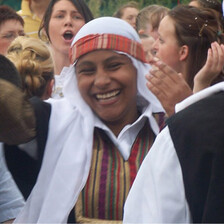The Electronic Intifada Dublin 20 December 2011

The Aidoun youth theatre group with supporters during their Ireland tour.
Lost Youth - Songs of Solidarity, a new benefit album for a young Palestinian theater performer arrested and imprisoned by Israel on his way to tour Ireland, Scotland and England in 2005, has been released. A portion of the proceeds will go towards highlighting the child prisoner issue.
Regarded as legitimate targets by Israel’s military, children have made up a shocking 1,327 of the 6,487 Palestinians killed by Israeli forces since 2000, according to the human rights organization B’Tselem.
Israel’s disregard for the rights of Palestinian minors is also displayed within the Palestinian prisoner population. A recent Defence for Children International-Palestine Section report found that Palestinian children continue to be systematically ill-treated in the Israeli military court system (“NGO Progress Report, Follow-up to the Concluding Observations (Israel),” 1 August 2011).
Each year hundreds of Palestinian children, some as young as 12 years, are arrested and prosecuted in Israeli military courts. The overwhelming majority of these children are detained inside Israel in violation of Article 76 of the Fourth Geneva Convention.
In order to help highlight such issues, Lost Youth - Songs of Solidarity, a new benefit album, has been released. The topic has had particular local relevance since a 15-year-old theater performer was arrested and imprisoned by Israel on his way from Palestine to Ireland in 2005.
Muhammad Sameh Hashash was part of the Aidoun youth theater group from Balata refugee camp near Nablus that toured Ireland, Scotland and England, performing traditional dance and drama at local festivals.
Organizers had seen the trip as a chance to counteract the demonization of Palestinians and demonstrate to an international audience the vibrancy, richness and beauty of Palestinian culture. It was also an opportunity to take a large group of young people away from the dangers and stresses of a life enclosed by occupation and conflict.
Before the tour began Aidoun director Mohammed Abu Hakim explained that the children of Balata had spent “… the past four years in the square kilometer around Balata camp. Several have rarely left Nablus since they were born. They feel alone, that the world doesn’t care about them. Seeing the world and meeting people will change their lives.”
As the group crossed between the occupied West Bank and Jordan, Muhammad Sameh Hashash was taken away by Israeli soldiers.
“After that he disappeared out of our eyes. We were crying and scared for him. When we were in Jordan we heard that Muhammad had been arrested. The whole situation became like a funeral — everybody was crying,” said Abu Hakim following the incident. “The Israelis have killed his childhood. His dream was of travelling and to talk about Palestine … They put his dream in a cage.”
Muhammad was kept in interrogation for over two months and ultimately sentenced by a military court; he was charged with conspiracy against Israel and associating with “wanted” persons. He is due for release in 2012.
As well as dancing and acting, Muhammad made documentary videos about life in Balata and had been a youth reporter covering regular military invasions. Balata is the largest and poorest camp in the West Bank. Most of its population originate from around Jaffa on the Mediterranean coast, but now more than 30,000 residents are crammed into narrow alleyways and crumbling buildings far from the sea. Muhammad had never seen the sea, and rarely left the city over the previous five years. He grew up in the “Hashashin” quarter, the most deprived part of the camp.
Intense repression
Like many people in Balata, he shared his parents’ two bedroom flat with eight brothers and seven sisters. In 2005 Balata was the focus of intense repression by the Israeli army with daily incursions and regular attacks on the community. Having witnessed friends killed on the streets, Muhammad had resolved to train as a journalist in the hope of conveying the reality of Balata and Palestine to international audiences. He hoped his journey to Ireland would help spread their stories abroad, but he himself never made it across the border.
Despite the group’s distress at Muhammad’s arrest, the tour continued. Such difficulties were normalized occurrences, constituent parts of a tragic life experience. The rest of the group were no strangers to adversity. At some stage, all of the young boys had been arrested by the soldiers and three of the performers had been shot. The only place they had to practice had also been occupied and ransacked by the military. Part of their determination to continue with their project, despite impediments, stemmed from a belief that art, like education, is a form of struggle.
The performers of Aidoun refused to allow Israeli oppression to make them grow up an ignorant or silent generation. Children comprise the majority of Balata’s population and they have been politicized by the occupation. Harsh conditions and the deliberate targeting of minors have necessitated a toughened exterior in young people. Travelling to Ireland gave the youngsters some welcome respite from their daily experience of harassment, invasion and the constant threat of harm. In Ireland they had a chance to relax, make friends, play in open spaces and enjoy themselves as children.
Palestinians are physically cut off from the rest of the world by the occupation. A sense of abandonment is compounded by the lack of international action against Israel’s persistent abuses and is further reinforced by the media’s misrepresentation of the Palestinian position.
The trip to Ireland helped break the isolation for these young people and inspire some hope for the future. Elements of the trip were brimming with significance for the group. A trip to the Irish seaside was fun, but it also stirred deep emotions. The youth of the camp all knew where their roots lay, but checkpoints and military restrictions made it impossible for them to visit confiscated lands along the Mediterranean coastline. The chance to play on an Irish beach reconnected them with the sea, energizing an emotional attachment passed down through generations of Palestinian refugees.
Natural solidarity
History has created a lot of natural solidarity between Ireland and Palestine. The group witnessed some of this firsthand with Palestine flags, large crowds and warm welcomes throughout. During their stay they were enthusiastic to learn about any parallels between their own experiences and those of people affected by political conflict in Ireland.
The impact Irish solidarity had on the group was best summed up by Nour Hafnawi (16) who spoke for the group by saying: “When the occupation causes us pain, it gives us strength to know that people in Ireland are with us and we are not alone. They are with us because they know what pain is and what an occupation means to your life. How it suffocates you. In our hearts, part of us is Irish. We are family … like brothers.”
Muhammad Hashash was denied these positive experiences. His young hopes and excitement at the prospect of the trip of a lifetime came to an abrupt end when he was shown the inside of an adult prison. Coordinators of Aidoun’s tour of Ireland felt that it was important to show Muhammad he had not been forgotten.
Rich, passionate and absorbing, Lost Youth - Songs of Solidarity contains an eclectic mix of songs and tunes from an assortment of genres. This variety reflects the diversity of the growing Palestine solidarity movement. Twelve respected artists are featured as traditional Irish and Basque tracks nestle comfortably between thought-provoking political folk and Palestinian hip-hop contributions.
Each track has a special relevance to the project. Both Barry Kerr and Damien Dempsey, for instance, sing about the sea, highlighting the connection that Balata’s refugees have with the Mediterranean and their desire to return to their homes along the coast. Such tracks are accompanied by powerful anthems from Lowkey, DAM and David Rovics as well as enchanting tunes and soft ballads from the likes of Kila, Paul MacAdaim and Grainne Holland to name but a few.
Each sale represents a practical act of solidarity, highlighting another element of the complex injustice that Palestinians endure on a daily basis and hopefully offering a glimpse of hope to the young victims of Israel’s prison policy.
Lost Youth - Songs of Solidarity is available now; visit lostyouth-palestine.com for more information.
James Edwards is a social care worker based in Dublin, Ireland. He helped co-ordinate Aidoun’s 2005 tour of Ireland and can be reached via JamesEdwards19781978 AT gmail DOT com.

